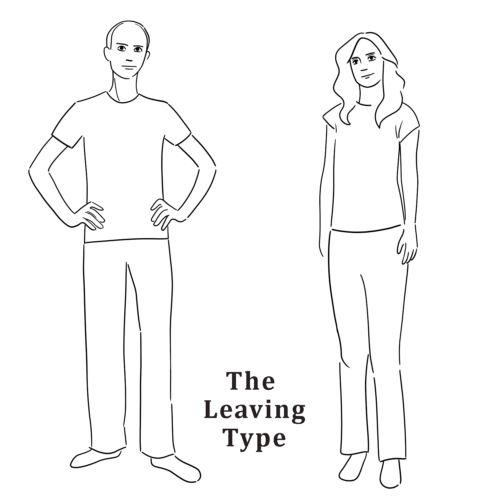Other names
Originally labelled by Reich as “The Schizoid.” Other names that have been used over the years for this Type include “The Unwanted Child” and “The Dreamer.”
Safety Strategy
The basic characteristic of this Type is that, when triggered, consciously or otherwise, their attention moves into their head and the world of thoughts, beliefs and judgements. They dissociate from the sense of the body. The inner world of this Type is marked by a sense of not being safe of which they may or may not be aware.
Origins
It is believed that this pattern may have its origins as early as in the womb environment. The developing nervous system registers a sense of unsafety and begins to withdraw attention from the body. It may also begin in early infancy if there is an underlying sense of not feeling safe or perhaps of inadequate connection to the mother.
Like the Endurer type, it seems that the mechanism by which this safety strategy comes on is mediated by the nervous system. There may be a trigger, a sense of unsafety registered unconsciously, but it is not a straightforward reaction to trauma (Oral and Aggressive) or conditioning (Rigid).
Positive Qualities
People strong in the Leaving Type are great abstract thinkers and can be incredibly creative at a mental level. They may also have spiritual gifts and find themselves in possession of deep insights or the capacity to heal others. They are mind-orientated people and the reality is that we do, especially in the West, live in a very mind-orientated world. So Leaving Types can make use of their specific talents and contribute a great deal to society.
Negative Attributes
People strong in this Type are dominated by fear, almost as though they actually have a layer of fear surrounding them. Others may notice this but they themselves may be unaware of it. This fear prevents them from manifesting the ideas that they have, which are often really great ideas. They may be unaware that they are afraid of the world. Rather, it seems to them as though somehow something is always blocking them. Over time, this can lead to an underlying sense of frustration, resignation or depression.
People of the Leaving Type will suffer a considerable lack of sensation in their body. They may also find that it is hard to focus on one thing for any length of time. Their attention seems to flit around the place like a butterfly. They often experience life as though it is going on behind a window and they’re on the other side, looking in. They tend to lack resilience. They tend to struggle with social connection, preferring to meet others online, where it feels more safe.
Leaving-Oral Subtype
Pretty common, the Leaving-Oral has bursts of energy which soon dissipate. There’s usually a phase of highly energised creativity, resulting in a new idea and a plan. As soon as any barrier to the manifestation of the plan emerges, however, they simply collapse, and remain collapsed for months or years until the pattern repeats.
Leaving-Aggressive Cooperation
A curious mix frequently seen in the world of the tech startup is Aggressive-Leaving cooperation. The Leaving Type is the ultra-geek, who understands the code of the new app to the nth degree. The Aggressive Type is the one who will take the new app out into the world, attract investors and sell it unrelentingly. For the app to make it, both are needed.
Appearance
Like the Oral Type, there is a “classic” Leaving Type. However, many people who are strongly in this Type do not look this way.
- a tall, thin body
- somewhat angular appearance, as though kind of disjointed and perhaps mechanical
- a frozen or shocked look in the eyes
- thin arms and legs
- shoulders habitually raised, as though in shock
- skin colour pale
- cold hands and feet
- feel clawing the earth for connection
Behaviour
- Fear of eye contact
- Struggle to dress appropriately for the environment
- Strong attraction to abstract worlds and perhaps spirituality
- Tendencies towards mental arrogance
Psychology
- Haunted by a sense of not being wanted, possibly caused by inadequate eye contact with the mother.
- Marked tendency to very quickly dissociate from the sense of the body and disappear into a world of thinking.
- Tendency to find fantasy a safer way to get pleasure, as opposed to social contact or physical activities.
- Panic attacks, nightmares and sudden bursts of emotion, which rapidly disappear.
- Hypersensitivity.
- Fearful of sudden change and meeting others unprotected.
- Highly intuitive, which may have developed to compensate for their fear of social connection.
- Hypervigilance
- Self-hatred and self-mutilating behaviours manifest in a minority. Likewise suicidal thinking.
Treatment Directions
- As with the Endurer Type, this condition appears to be initially mediated by the nervous system. Over time, it may become simply a conditioned response, as the body becomes armoured and the mind gets habituated to it. Or it may remain mediated by the nervous system. The latter case will require a more gentle approach.
- The core issue for the Leaving Type is the sense of not being safe that pervades all that they do. Generally, this is either not acknowledged or only partially so. If they can learn to recognise this sense of unsafety, they can begin to look at how they can create for themselves situations where they can feel safe and thus develop.
- The primary goal is to feel the body more, to reinhabit the body. This will create a sense of resilience and safety.
- It’s likely that key areas of the body are armoured, blocking an easy return to the sense of the body. These areas are neck, throat and shoulders especially.
- Raised Shoulders exercise a good idea on a regular basis, accompanied by deep breathing.
- Practising staying present even when getting triggered to a mild degree.
- Breathwork techniques are usually too evocative for them. The exception being Mammalian Belly Breathing which is great for them to practise.
- Working the forehead and ocular segments of Reichian armour is a great idea.
- Practising self-care and self-love is important. They need to treat themselves as though they have value, even if they don’t initially believe it.
- Massage
- Grounding exercises, feeling the lower body and playfulness are all good.
- Anything which can support them to feel more a part of the physical world is useful.
Find my book on Reichian Character Structure here



